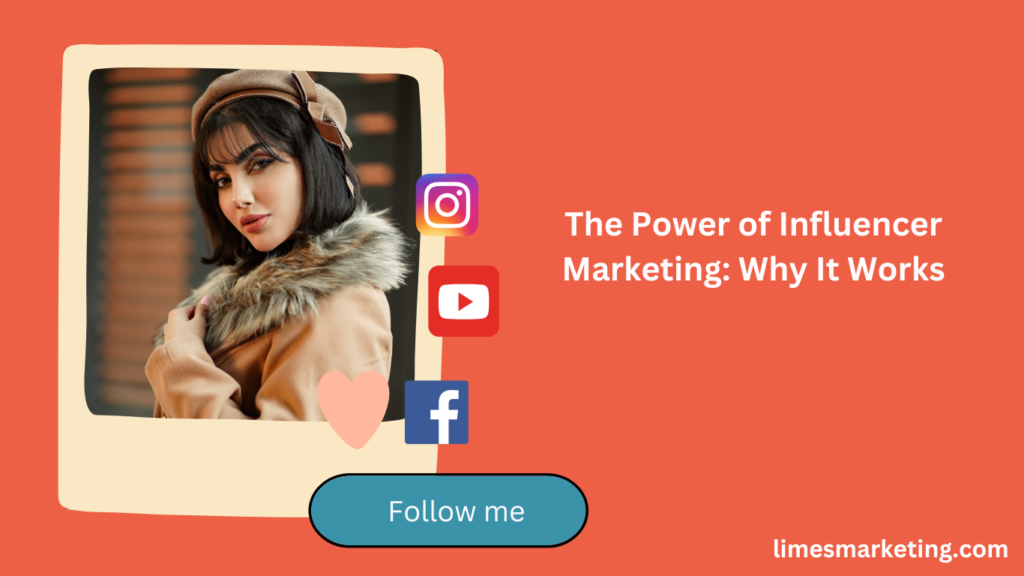Influencer marketing strategies In today’s digital age, traditional advertising methods are facing an unprecedented challenge. Consumers are becoming increasingly adept at ignoring or blocking ads, making it difficult for brands to reach their target audiences effectively. In this landscape, influencer marketing has emerged as a powerful strategy that captivates and engages consumers in a way that traditional advertising can’t. In this blog, we’ll explore the reasons why influencer marketing works so well and why it has become an essential tool for brands looking to connect with their audience.

1. Authenticity and Trust
One of the primary reasons influencer marketing is so effective is its ability to foster authenticity and trust. Unlike traditional ads that often feel forced and insincere, influencers have a genuine connection with their followers. They are seen as peers rather than advertisers, which makes their recommendations feel more trustworthy.
When an influencer promotes a product or service, it comes across as a personal recommendation rather than a sales pitch. Followers are more likely to trust the influencer’s opinion because they believe that the influencer has tested and genuinely enjoys the product or service. This trust is invaluable in a world where consumer skepticism towards traditional advertising is on the rise.
2. Targeted Reach
Influencer marketing allows brands to reach specific niche audiences with precision. Influencers often have a niche or focus area, and their followers share an interest in that particular domain. This targeted approach ensures that your message is reaching the right people who are more likely to be interested in your product or service.
For example, if you’re a fitness brand, collaborating with a fitness influencer will expose your brand to an audience that is already passionate about fitness. This means that you’re not wasting resources on reaching people who have no interest in what you offer.
3. Engagement and Interactivity
Influencers have a unique ability to create engaging and interactive content. They can craft compelling stories, share personal experiences, and conduct polls or Q&A sessions with their followers. This level of interactivity fosters a sense of community and involvement, drawing followers deeper into the content and the brand.
When influencers feature a product or service in their content, they often provide followers with a call to action, encouraging them to like, comment, share, or make a purchase. This engagement is far more active and participatory than the passive consumption of traditional ads.
4. Diverse Content Formats
Influencer marketing is not limited to a single content format. Influencers can create a wide range of content, including photos, videos, blog posts, stories, and live streams. This versatility allows brands to experiment with different content formats to find what resonates best with their target audience.
For example, if you’re marketing a fashion brand, you can work with influencers to showcase your products through stylish Instagram photos, unboxing videos on YouTube, or in-depth blog reviews. This variety ensures that your message reaches consumers in the format they prefer, increasing the chances of a positive response.
5. Improved SEO and Online Presence
Influencer collaborations can also have a positive impact on your brand’s search engine optimization (SEO) efforts. When influencers create content related to your brand, they often include backlinks to your website or social media profiles. These backlinks can improve your search engine rankings, making it easier for potential customers to find your brand online.
Moreover, influencer-generated content contributes to a robust online presence. As influencers share their experiences with your brand, it creates a buzz that extends beyond their immediate followers. This ripple effect can lead to increased brand awareness and an expanded online footprint.
6. Cost-Effective Marketing
While influencer marketing can require a budget, it is often more cost-effective than traditional advertising channels, especially considering the potential return on investment. Collaborating with influencers eliminates the need for expensive production, media buying, and ad placement costs.
Additionally, influencer marketing allows brands to work with micro-influencers who may have smaller followings but offer higher engagement rates. These micro-influencers often charge lower fees than macro-influencers or celebrities, making influencer marketing accessible to a wider range of businesses.
In conclusion, influencer marketing has gained prominence because it taps into the power of authenticity, trust, targeted reach, engagement, diverse content formats, improved online presence, and cost-effectiveness. It’s a strategy that connects brands with their audiences on a personal level and provides a more genuine and engaging alternative to traditional advertising methods. As consumer preferences continue to evolve, influencer marketing is likely to remain a vital tool for brands seeking to connect and resonate with their target audiences.
Are you ready to harness the power of influencer marketing for your brand? Reach out to influencers in your niche and explore the myriad opportunities this strategy offers to elevate your brand’s visibility and engagement in the digital world.
